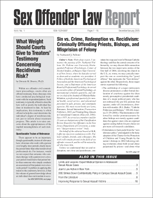Sex Trafficking: Specialized Responses Needed
Author: Amelia V. Rubenstein, M.S.W., L.G.S.W..
Source: Volume 15, Number 01, December/January 2014 , pp.1-3(3)

next article > |return to table of contents
Abstract:
Attempts to design policy to adequately address the myriad problems associated with sex trafficking and exploitation—some of which are social issues and many of which are criminal violations—have been increasing, particularly in a global environment in which nations have found themselves on one end of the enterprise, either as the origin or the destination for women and girls caught in a trafficking ring. Among professionals and practitioners, the wide range of variability in the research has confounded attempts to formulate effective responses. Also, there has been little attention given to the role of the trafficker, the primary offender in the complex organized criminal activity. In the U.S., coupled with this blind spot is an historical reluctance to arrest the “Johns” who solicit prostitution, and there has long been an unwillingness to appreciate the wide-ranging negative consequences for victims, families, communities, and the broader society. This narrow understanding of the harms associated with sex trafficking has hindered efforts to effectively prevent and respond to these sex crimes. The assertion that sex-for-hire is a victimless crime is being re-examined. This article discusses the complexities and trends in examining these problems, and resulting legislative efforts to address it.Keywords: End Sex Trafficking Act of 2013 (H.R. 2805/S. 1354); “Confronting Commercial Sexual Exploitation and Sex Trafficking of Minors in the United States”; informed approach to global problem
Affiliations:
1: TurnAround, Inc..